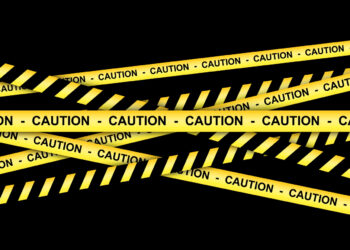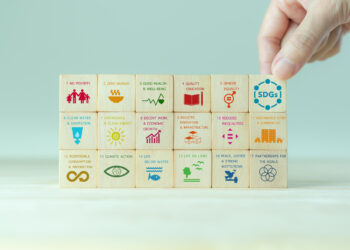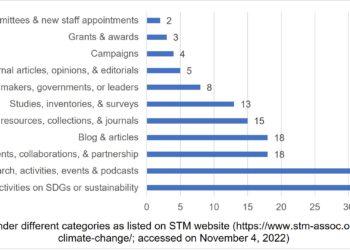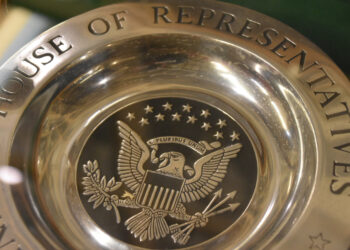While co-designing an EASE-hosted session at the latest ISMTE Global Event (July 18-20, 2023), our team aimed at exploring the importance of leadership and accountability in the sustainability of the publishing industry. This piece captures some of my thoughts on this issue.
To me leadership is not only being a pioneer, or leading the way. It also includes keeping the path that we created and walked along open and clear so that others can follow us. To me, one can’t be a leader if there are no followers. Thus, leadership means going forward with others. Accountability is, on the other hand, thought of as imposed systems or rules compelling us to show that we are responsible and honest while performing our duties, keeping our promises. To be accountable, we must know our capability and capacity to meet our commitments to our clients, to our peers, and to those who look up to us as leaders. Thus, leadership and accountability go hand in hand.
This relationship can be explained through examining some evolving examples from the scholarly publishing industry that focus on sustainability, sustainable development, and the UN’s Sustainable Development Goals (SDGs).
A first example with sector-wide reach and impact is the International Publishers Association (IPA) and United Nations (UN) showing leadership by launching the SDG Publishers Compact back in October 2020 at the Frankfurt Book Fair. As of July 20, 2023, they have successfully brought on board 294 publishers and their associations (Europe 143, Africa 20, Asia and Pacific 63, the Americas 62, and Middle-East 6) to commit to ten action points of the Compact. If we go to the FAQ section of the Compact page (Q: Do we need to report on our progress?), it reads “As the compact was launched during the Frankfurt Bookfair 2020, we are planning to use this annual event to check in with all signatories and their progress.” An attempt was made at the Frankfurt Book Fair 2022 to share some survey results on the progress of the Compact’s implementation. But nine months on, the full or partial survey results haven’t been made public. In July 2022, my quick assessment showed that many publishing entities were not doing much (or even anything at all) toward what was expected by the Compact. A proper assessment by the UN and/or IPA could tell us the progress of the Compact over the past three years, and thus how the publishing industry is contributing to the global efforts towards the SDGs. We hope that this will be done around the time of Frankfurt Book Fair 2023, in three months’ time.
The next two examples show leadership in supporting the current and potential signatories to the Compact to take pertinent actions. IPA’s SDG Dashboard has been a fantastic SDG-related repository, which was founded in 2021. Between November 4, 2022 and July 20, 2023, on average a 20% increase in resources was seen for each SDG (several relevant resources are mentioned in more than one SDG) (Figure 1). While the increase is very low or absent in most of the SDGs, it is an encouraging example of accountability where the commitment to bringing in the SDG-related instruments in one place is continuously being met.
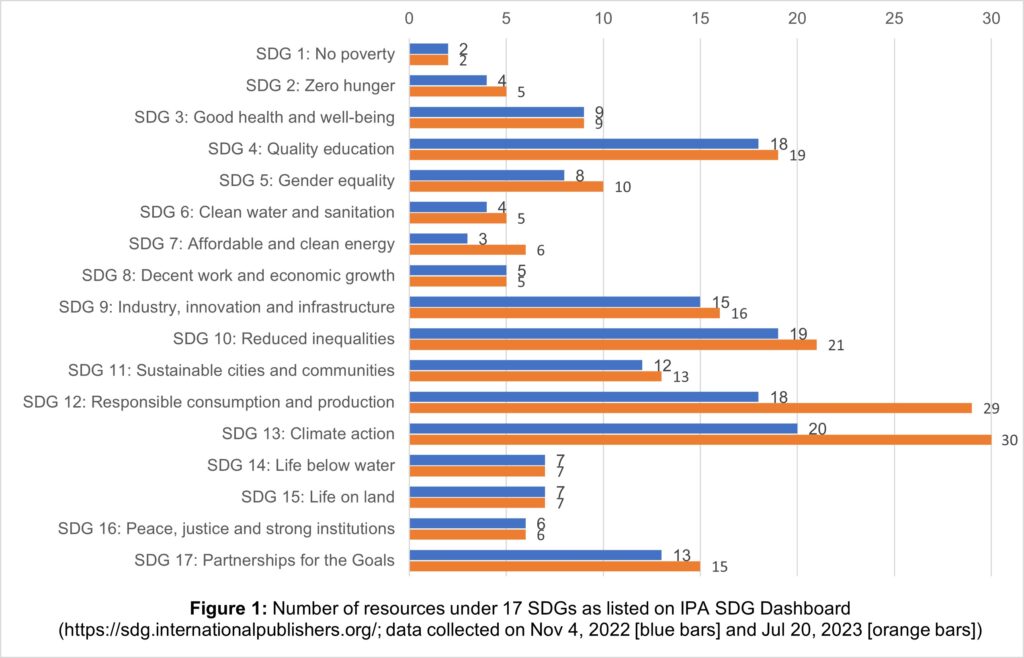
Support for the SDGs is not limited to organizations – like-minded individuals can also do wonders when they come together. The Higher Education Sustainability Initiative (HESI) is supporting SDG Publishers Compact Fellows, for example, a pioneering Community of Practice currently with 22 members, which has been developing guidance and many useful tools. HESI Action Group Annual Report 2022 records a list of exciting activities this group had been involved in. Their Top Action Tips, for example, for different stakeholders, including academic publishers, editors, and reviewers, are very useful. With EASE (European Association of Science Editors), the group conducted a survey to check the status of publishers in terms of awareness, adoption, and implementation of the Compact, results of which are expected to be made public soon.
We also see leadership in the sustainability arena by individual agencies operating in multiple dimensions. For example, EASE, a signatory of the Compact, issued a manifesto on environmental sustainability in scientific publishing; made sustainability as the theme of annual conference; has an Environment and Sustainability Committee as one of its special interest groups, which I am a part of; has established EASE virtual forest around the world from Mexico to Togo to Indonesia; and continues pursuing a sustainability agenda by being part of different initiatives (e.g., co-organizing Sustainable Solutions Summits, contributing to develop the STM Association’s SDGs Academic Publishers Forum-led ‘STM Sustainability Roadmap’). We see similar as well as different commitments towards sustainability and the SDGs from others (e.g., ALPSP and STM Association).
But, in the absence of regular auditing, as envisaged by the Compact (Action Point 10), it is difficult to ensure accountability. We can see some individual publishers are publicly disclosing their sustainability reports in recent years. For example, Emerald’s latest progress report on the Compact, Oxford’s Responsible Publishing Report 2022-2023, Springer Nature’s Sustainable Business Report 2021 (out in 2022), and Wiley’s ESG and Wiley Impact Update for 2022 not only capture a wide range of initiatives outlining each respective publisher’s leadership, but also represent their leadership in ensuring accountability.
2023’s Global Goals Week is taking place during September 15-24. The key purpose of this campaign is accelerated action, improved awareness, and stronger accountability for the SDGs. While the world will be taking stock of the SDG progress in September, what are scholarly publishers and their associations going to do? Will some of us come together and issue a joint statement as we did ahead of the climate change conference (COP26) in 2021? Or will we go beyond that? Who is going to take lead, and facilitate accountability across the publishing ecosystem?
